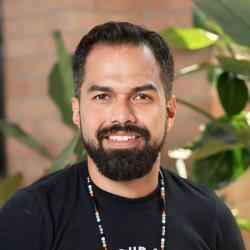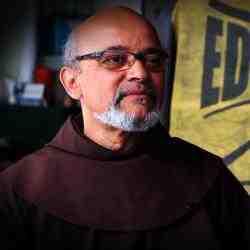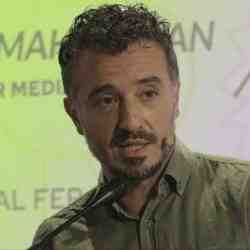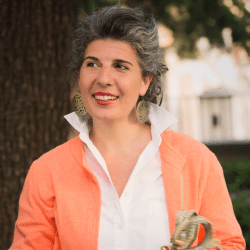Introduction
Ashok Kamath is transforming the quality of foundational numeracy education across 50,000 government schools in Karnataka, Odisha, and Andhra Pradesh and has impacted 7 million children, across over 100,000 schools with stronger numeracy learning outcomes. He has achieved this through a multi-stakeholder intervention that redesigns the pedagogy and methodology of the supply side of foundational education while building a network of local champions that mobilize community and political participation on the demand side of public education.
The New Idea
Ashok Kamath firmly believes that for an education initiative to succeed in India, it must be designed to reach a large scale from the beginning. His work is based on the principle that active involvement from all parties is crucial for children to receive quality foundational education. The Ganitha Kalika Andolana (GKA), Akshara Foundation's flagship initiative, is a collaborative effort aiming to transform math learning for children in grades 1 to 5 in government schools. GKA employs a unique 360-degree model that involves various interventions targeting multiple stakeholders on both the demand and supply sides of the education system, including state bureaucracy, teachers, and the community.
On the supply side, Akshara Foundation is reshaping how math is taught through the GKA Math Kit, deployed in every state school by the government. This kit changes the typical 'abstract to concrete' teaching approach to a 'concrete to abstract' method, emphasizing 'understanding by doing' and applying math skills in daily life. It acts as a bridge between teachers and students to enhance their interactions. Akshara collaborates with state education departments to secure their support for providing math kits in every classroom. They build capacity among teachers through continuous training and refresher programs to deploy the kit effectively. They also design teaching tools for more interactive and relevant math education. To extend support beyond the classroom, the Akshara Foundation has introduced Building Blocks, an after-school e-learning app available on the government platform DIKSHA. It provides children access to math practice through games on their phones in nine languages, both online and offline. Ashok's model also promotes accountability within the public education system by using monitoring support tools like mobile apps for administrative resource persons.
Increasing community demand for high-quality foundational education is essential for the long-term sustainability of change initiatives. Ashok addresses this by building a local network of over 18,000 education volunteers on the demand side of his multi-stakeholder intervention. These volunteers support teachers in ensuring they have the necessary materials for each class and parents in ensuring children have access to after-school learning support through Building Blocks. Additionally, Ashok taps into the competitive nature of Indian culture with community-led "Gram Panchayat Maths Contests," engaging parents, teachers, and local government members to assess children's math skills. This approach creates awareness, involvement, and focus on numeracy learning outcomes. Building on this momentum, Akshara Foundation launches campaigns like the 1-3-6-9 Wall Writing Campaign to raise awareness and encourage community participation in various education-related activities. These include once-a-month School Development and Monitoring Committee meetings, once-a-quarter parents' meetings, the biannual parental review of children's learning as part of the government's Community Goes to School program, and ensuring regular attendance of children for a continuous period of 9 months. This multifaceted approach aims to strengthen community involvement in the educational journey of children.
The sustained engagement with the state and community, involving all major stakeholders in public primary education, is what makes Akshara Foundation's idea revolutionary and effective. The GKA model, by securing government support and fostering community demand, acts as a linchpin in achieving lasting improvement in foundational numeracy. Government buy-in and investment in GKA kits make them accountable for the model's outcomes, while community involvement ensures sustained demand for high-quality education.
The Problem
Ashok's work centers on addressing poor foundational numeracy skills, which stem from a lack of clear understanding at the basic level. He noticed widespread anxiety among students and even teachers regarding math. According to the 2018 Annual Status of Education Report (ASER), less than 22 percent of fifth-grade students could perform simple division, a situation worsened by the COVID-19 pandemic. Despite the National Council of Educational Research and Training (NCERT) recommending that children recognize two-digit numbers up to 99 by grade 1, only 41 percent of first-grade students and 72 percent of third-grade students can do so (ASER, 2019). ASER also reveals a declining trend in numerically proficient children over time.
Several interconnected factors contribute to these extensive gaps in foundational numeracy. First, there is insufficient classroom learning, with students receiving only about two hours of math instruction per week. Ineffective pedagogy, relying on rote learning and non-interactive teaching methods, hampers students' ability to grasp mathematical concepts. The abstract nature of mathematics exacerbates the numeracy gaps due to ineffective teaching and inadequate learning materials. Teachers, armed with only textbooks and lacking necessary training, struggle to effectively impart abstract numeracy skills.
Secondly, the public primary education system lacks emphasis on learning outcomes and has minimal monitoring. The absence of measurement and incentives, as seen in the automatic promotion system in government-run primary schools, harms student education, as unmeasured processes or outcomes tend to lose importance.
Moreover, the state's education policy prioritizes improving access rather than the quality of education. The societal focus on literacy creates a higher demand for literacy skills, neglecting the need for high-quality numeracy education. Consequently, state policy and resources in foundational education are predominantly directed toward language skills, leading to deficiencies in the supply of foundational numeracy education. Issues such as poor pedagogy and a lack of incentives in the system remain unaddressed.
The Strategy
Right from its inception, Ashok believed that interventions in public education had to be designed for scale in order to create a sustainable systematic impact. In order to truly scale in a sustainable way, Ashok saw that education programs had to be designed and embedded into the existing frameworks of government infrastructure, rather than building parallel systems. The GKA program has been designed using a multi-stakeholder approach that distributes the ability to solve across every level of the system and forging systemic partnerships so as to bring about significant shifts in numeracy education. The Akshara Foundation is able to target students, teachers, parents, the community, government bodies, and the broader educational ecosystem to bring about widespread, lasting change. All this is done by mobilizing relevant stakeholders within the education system to participate in a meaningful way.
The intervention starts by forming a partnership with the State Government by signing an MoU. Through the MoU, the state education secretary releases a tender to purchase and place GKA Math Kits in every classroom, grades 1-5, across government schools in the state. A notice is sent out from the state secretary’s office to each of the district and block officers who oversee the running of schools. Akshara Foundation’s staff engage with the Deputy Director of Public Education at the district level to ensure that interventions are implemented and accepted at all the rungs of the bureaucratic hierarchy. The involvement of high-level bureaucratic officials serves to add legitimacy and working with officials at all levels ensures that interventions are executed properly and travel down the system to generate the change envisioned on the ground.
To ensure that the Akshara Foundation’s teaching approach and pedagogy are disseminated system-wide effectively, they have partnered with the District Institute of Education & Training (DIET). The Akshara Foundation then works towards training teachers who will be deploying this new pedagogy in their classrooms. They adopt a “train the trainer” approach, where members of DIET who are responsible for teacher training become proficient in the pedagogy and delivery of the GKA program and then provide training to teachers in the classroom. Remedial support through e-learning modes is provided by Akshara to enable sustained capacity building and adoption of the pedagogy. This helps provide uniformity in content and bridge any gaps in transference. The GKA Teaching Learning Videos have been mapped onto the existing National Curriculum Framework.
As a result of having access to quality teaching-learning materials and training on how to transact them and the textbook better, teachers are able to impart a concrete understanding of mathematical concepts to students through the experience of doing math rather than memorizing it. Students who were exposed to the GKA approach for a period of three years have scored 30% to 50% higher than the national and state average that is recorded by the Annual Status of Education Report (ASER). Their ability to understand and apply their learning to real-life situations is also evident.
When a third grader in Karnataka was asked to subtract one from a thousand during a high-profile school visit, he reached out for a thousand rupee note of Play Money from the GKA kit and systematically broke it into ten hundred and so on to finally arrive at nine hundred and ninety-nine rupees. He then walked up to the blackboard to write down what he had done in the formulaic format, showcasing a clear concrete-to-abstract understanding of the concept of subtraction. The Akshara-designed GKA math kits consist of items like abacuses and measuring tapes that teachers use in class to teach foundational numeracy. These are now present across all public schools in Karnataka and Odisha and across 2,000 schools in Andhra Pradesh.
In order to imbue a culture of demanding good quality education in the ecosystem, the Akshara Foundation has mobilized a community of over 18,000 Education Volunteers. These are individuals, oftentimes alumni of the schools they volunteer in, who serve as a bridge between the school and the community. They engage with teachers in the classroom to support them in running this pedagogy, and then with parents in supporting their children with after school learning. The Akshara Foundation has provided Building Blocks, an app hosted by the government e-learning platform, DIKSHA, to provide games, quizzes, and interactive lessons that are linked to the lesson flow of the textbooks for children to be able to keep track and receive additional support.
Education Volunteers play a pivotal role in ensuring that the demand side of quality public education is built up. They work within communities to organize Gram Panchayat Math Contests. These are community-led events where all stakeholders in local government, parents, and school leaders come together. At this contest, children from every school in the Gram Panchayat are given a grade-level math quiz that they all attempt together. At the end of the quiz, the results are immediately calculated and announced, sparking mass public interest from all the stakeholders present on the results of the test, reflecting on the quality of education that the children receive. Ashok has seen this approach of Math Contests sits well within the Indian cultural ethos, which naturally holds a high value on marks that children get in their exams. He uses these contests to garner community and political participation in public education. The Education Volunteers then sustain this engagement through community campaigns like the 1-3-6-9 wall writing campaign and raise demand for quality education sustainably and constructively.
The Akshara Foundation has embedded monitoring and evaluation systems into the design of its intervention. Ashok claims that for every rupee spent by the foundation, the government contributes between five to six rupees towards the expansion of the program. He saw the need for systems for monitoring and evaluations to be transparent and accountable. The adoption and progress of the GKA program are all tracked and reported on a public dashboard. The data for the dashboards are provided by the teachers and cross-verified by the Gram Panchayat office and Education Volunteers. Independent evaluation bodies like the Annual Status of Education Report (ASER) and National Achievement Survey (NAS) also report on the foundational learning progress of children in these states. Along with this, the Akshara Foundation tracks the scores of children from their exams and math contests each year to see their trajectory of improvement. All these processes have been embedded into the annual functioning of education in the state to ensure the efficacy of the program. Akshara’s qualitative impact is perhaps best captured by headmaster Mr. G. Ramanna’s declaration that “there is no fear about maths. Children are happy with it, happy to do it.”
The GKA program is currently present across all schools in Karnataka and Odisha, and now expanding beyond its pilot phase in Andhra Pradesh. Over 7 million children, across 100,000 schools are being trained using the GKA Math Kit and benefitting from this intervention. Through their partnership with state governments and the impact being reported at national levels through ASER and NAS reports, Ashok is being invited by other state governments to also adopt the GKA intervention, with pilot launches being planned in 5 other states across India.
The Person
Ashok Kamath hails from Mumbai, India, and pursued engineering at the prestigious Indian Institute of Technology (IIT) in Bombay. He spent over two decades at Analog Devices Inc., serving as the Managing Director, where he played a crucial role in developing the company's global strategy and expanding into new markets.
Ashok attributes much of his success to the quality education he received from an early age. His well-rounded foundational education equipped him with strong mathematical skills, enabling him to enter top-notch universities and excel further. However, he observed that this access to quality education was not available for many children in the country during their early school years. While at IIT, Ashok benefited from the Indian government's subsidy program, which made his education more affordable. He considered this support a badge of honor and an investment from his country.
In 2002, Ashok made a pivotal decision to leave his corporate career and repay what he viewed as a 'debt of honor' to his country by empowering millions of disadvantaged children. He immersed himself in addressing the complex challenges of the education sector in India and conceived the idea of GKA in 2012, envisioning a model that could operate at a population scale. Since 2002, Ashok has not drawn a salary from the Akshara Foundation. With a small team of 35, he is making a significant impact, transforming mathematical learning for 7 million children in India. Ashok's remarkable contributions to education and social development earned him the Namma Bengalurean of the Year award in 2019 and the Notable Alumni award from IIT in 2011.




